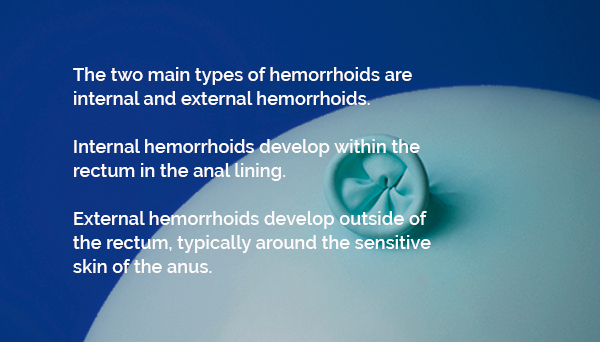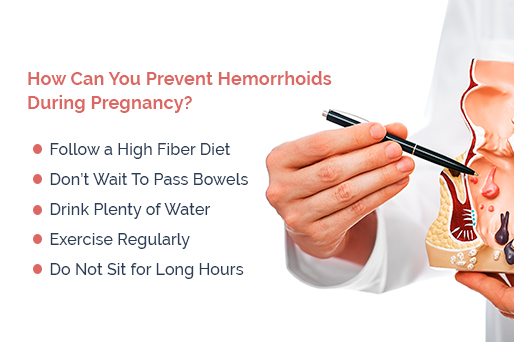
Hemorrhoids, also known as piles, are veins within the lowest part of the anus and rectum that become inflamed or swollen. When the walls of blood vessels stretch too much, these veins can bulge and become irritated, especially during and after a bowel movement. Hemorrhoids are a common medical condition more likely to develop in pregnant women.
Hemorrhoids from pregnancy can be uncomfortable and cause symptoms, including pain, swelling, soiling, bleeding, prolapse, inflammation and itchiness. Depending on the severity, some people may experience rectal bleeding if a bowel movement damages a hemorrhoid and breaks the lining.
While hemorrhoids are a common condition affecting many Americans each year, they are especially common in pregnant women. It is estimated up to 50% of pregnant women develop hemorrhoids during or after pregnancy because of increased blood flow and circulation in the pelvic area, often in the third trimester, roughly around week 28 for many women.
As a baby grows, the baby and uterus increase pressure along the veins through the anus, causing inflammation and swelling. Hemorrhoids are also commonly caused by straining during a bowel movement, which is very common for women who experience regular constipation. Pregnancy hormones can negatively impact and slow the bowels throughout pregnancy, potentially leading to straining.
If a stool is dry or firm, excess straining causes pressure in the rectum and surrounding veins, making them more likely to bulge or swell. Elevated progesterone levels can cause the veins and their walls to relax, making it easier to swell. Women with a history of hemorrhoids before pregnancy are more likely to develop them during pregnancy. Postpartum hemorrhoids are more likely to develop in women who have had hemorrhoids before becoming pregnant.
Increased blood flow and circulation to the pelvic region during pregnancy result in larger blood volume, increasing a woman’s likelihood of developing hemorrhoids while pregnant. Because hemorrhoids are also common in overweight people, extra pregnancy weight increases a woman’s risk of developing hemorrhoids. While pregnant, avoid sitting or standing for extended periods of time, as these contribute to hemorrhoid development.
Anyone with hemorrhoids should limit time on the toilet because sitting on a toilet can increase rectal pressure and worsen hemorrhoidal symptoms. Only sit on the toilet if you know you need to use the bathroom.

The two main types of hemorrhoids are internal and external hemorrhoids. Internal hemorrhoids develop within the rectum in the anal lining. External hemorrhoids develop outside of the rectum, typically around the sensitive skin of the anus. Internal hemorrhoids are often less likely to cause noticeable symptoms, as there are fewer pain-sensing nerves within the rectum. Because there are many pain-sensing nerves around the anus, external hemorrhoids often cause more pronounced symptoms.

While there are numerous effective treatments for hemorrhoids, one of the most effective things to do is to prevent hemorrhoids from developing in the first place. You may still develop hemorrhoids even if you take preventive measures.
Fortunately, these tips and tricks can reduce the overall likelihood of developing hemorrhoids and help prevent hemorrhoids during pregnancy:
Many pregnancy-safe hemorrhoid treatments are available to expecting mothers with hemorrhoids. In most cases, a physician will recommend nonsurgical treatment modalities to see if your hemorrhoids improve. Most physicians recommend waiting until after giving birth before considering hemorrhoid banding or hemorrhoid surgery.
For less severe hemorrhoids, some women may experience relief with lifestyle changes and home remedies. Others may require over-the-counter treatments such as creams, wipes and ointments for more persistent hemorrhoids to alleviate uncomfortable symptoms.
Many items at groceries stores or pharmacies may alleviate various hemorrhoid symptoms, including:
For more persistent hemorrhoids, you may need over-the-counter hemorrhoid treatments to provide more relief, including:
If over-the-counter medications and at-home remedies do not improve your symptoms, you may need a professional hemorrhoid treatment. In most cases, your physician will recommend postponing any minimally invasive or surgical hemorrhoid treatments. After delivering your baby, you will be eligible for medical hemorrhoid treatments. One of the most effective and minimally invasive hemorrhoid treatments is hemorrhoid banding.
Hemorrhoid banding using the CRH O’Regan System can provide lasting relief from pregnancy hemorrhoids. During a hemorrhoid banding treatment using the CRH O’Regan System, a physician places a rubber band around a hemorrhoid’s base, ensuring the band does not come into contact with nerve endings to eliminate post-procedure discomfort.
The rubber band cuts off the blood supply from the hemorrhoid. Within a few days, the hemorrhoid will shrink and fall off, often during a bowel movement. The entire process is painless, meaning many patients may not even notice the hemorrhoid fall off until they see it in the toilet. Another benefit of hemorrhoid banding with The CRH O’Regan System is there is no need for extensive preparation before the procedure.
Traditional treatments may require fasting or bowel clearing, but this is not necessary with the CRH O’Regan System. This treatment is nonsurgical, so there is no need for an extensive recovery period, allowing patients to return to their daily activities immediately. On the day of your hemorrhoid banding procedure, you will need to avoid heavy lifting and activities that cause excess pressure on the rectal area.
If your job or daily activities require heavy lifting, you will most likely be able to continue these activities the day after your procedure. Your physician can help determine specific instructions you need to follow after treatment. Hemorrhoid banding with the CRH O’Regan System treats one hemorrhoid at a time. The entire procedure typically only takes one minute.
The first step to relief would be to consult a CRH banding specialist in your area.
While many women develop hemorrhoids during pregnancy, postpartum hemorrhoids are also common. Post-pregnancy hemorrhoids often develop after giving birth because of the strain and pressure placed on the rectal area after delivering a baby. During delivery, women undergo significant stress to the pubic region.
In addition to delivery, many women also experience constipation or other related health conditions that increase the likelihood of developing hemorrhoids. Even if a woman does not have constipation or undergoes a cesarean section, the additional weight of the baby on the pelvis and abdomen can be enough to cause pressure on the rectal veins. It is estimated approximately 25% to 35% of women will develop postpartum hemorrhoids.
The majority of women are eligible for hemorrhoid banding following childbirth. Hemorrhoid banding can alleviate the uncomfortable symptoms of a hemorrhoid and creates a small scar where the hemorrhoid falls off, preventing another hemorrhoid from developing in the same spot.
Most patients need three banding sessions to alleviate symptoms caused by hemorrhoids (because everyone naturally has 3 hemorrhoids). In each session, one band will be placed to reduce the blood flow to the hemorrhoid slowly. Following the third hemorrhoid banding session, the blood flow will be cut off to all hemorrhoids, helping alleviate symptoms.
The CRH O’Regan System is a nonsurgical hemorrhoid treatment that is effective, painless and quick. Hemorrhoid banding typically takes just one minute to perform, allowing you to quickly return to your daily activities while alleviating uncomfortable or painful symptoms. Hemorrhoid banding with the CRH O’Regan System is also covered by Medicare and most insurance plans.
Find a physician near you that performs the CRH O’Regan hemorrhoid banding procedure to learn more about hemorrhoid treatment after pregnancy.